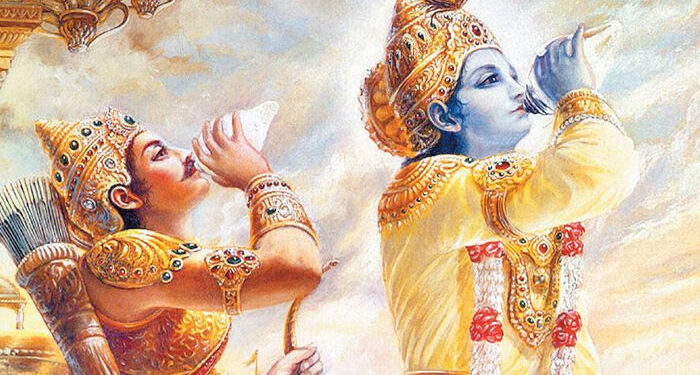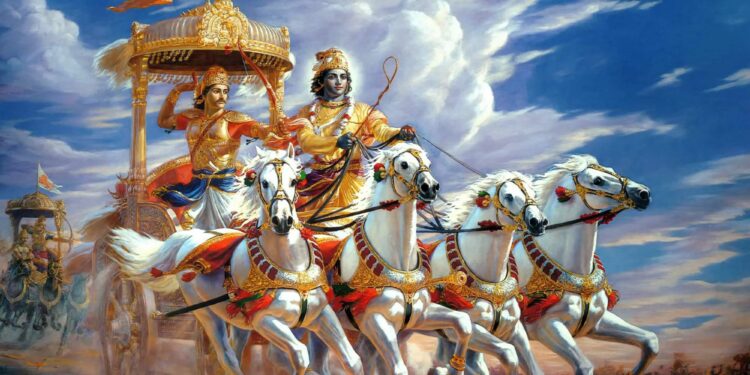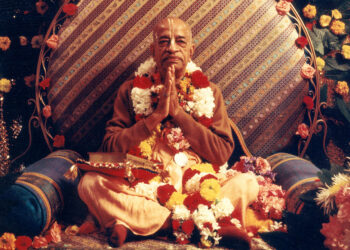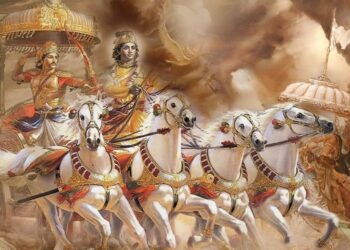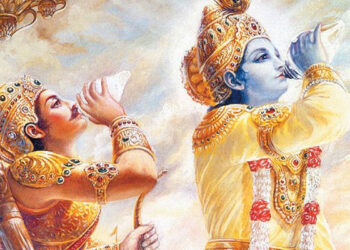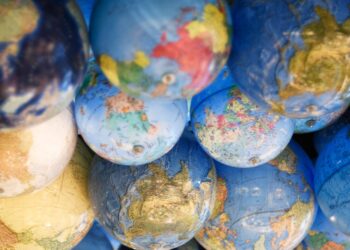TEXT 27
uccaiḥśravasam aśvānāṁ
viddhi mām amṛtodbhavam
airāvataṁ gajendrāṇāṁ
narāṇāṁ ca narādhipam
SYNONYMS
uccaiḥśravasam—Uccaiḥśravā; aśvānām—among horses; viddhi—know; mām—Me; amṛta-udbhavam—produced from the churning of the ocean; airāvatam—Airāvata; gaja-indrāṇām—of lordly elephants; narāṇām—among human beings; ca—and; nara-adhipam—the king.
TRANSLATION
Of horses know Me to be Uccaiḥśravā, produced during the churning of the ocean for nectar. Of lordly elephants I am Airāvata, and among men I am the monarch.
PURPORT
The devotee demigods and the demons (asuras) once took part in churning the sea. From this churning, nectar and poison were produced, and Lord Śiva drank the poison. From the nectar were produced many entities, of which there was a horse named Uccaiḥśravā. Another animal produced from the nectar was an elephant named Airāvata. Because these two animals were produced from nectar, they have special significance, and they are representatives of Kṛṣṇa.
Amongst the human beings, the king is the representative of Kṛṣṇa because Kṛṣṇa is the maintainer of the universe, and the kings, who are appointed on account of their godly qualifications, are maintainers of their kingdoms. Kings like Mahārāja Yudhiṣṭhira, Mahārāja Parīkṣit and Lord Rāma were all highly righteous kings who always thought of the citizens’ welfare. In Vedic literature, the king is considered to be the representative of God. In this age, however, with the corruption of the principles of religion, monarchy decayed and is now finally abolished. It is to be understood that in the past, however, people were more happy under righteous kings.
TEXT 28
āyudhānām ahaṁ vajraṁ
dhenūnām asmi kāmadhuk
prajanaś cāsmi kandarpaḥ
sarpāṇām asmi vāsukiḥ
SYNONYMS
āyudhānām—of all weapons; aham—I am; vajram—the thunderbolt; dhenūnām—of cows; asmi—I am; kāma-dhuk—the surabhi cow; prajanaḥ—the cause for begetting children; ca—and; asmi—I am; kandarpaḥ—Cupid; sarpāṇām—of serpents; asmi—I am; vāsukiḥ—Vāsuki.
TRANSLATION
Of weapons I am the thunderbolt; among cows I am the surabhi. Of causes for procreation I am Kandarpa, the god of love, and of serpents I am Vāsuki.
PURPORT
The thunderbolt, indeed a mighty weapon, represents Kṛṣṇa’s power. In Kṛṣṇaloka in the spiritual sky there are cows which can be milked at any time, and they give as much milk as one likes. Of course such cows do not exist in this material world, but there is mention of them in Kṛṣṇaloka. The Lord keeps many such cows, which are called surabhi. It is stated that the Lord is engaged in herding the surabhi cows. Kandarpa is the sex desire for presenting good sons; therefore Kandarpa is the representative of Kṛṣṇa. Sometimes sex is engaged in only for sense gratification; such sex does not represent Kṛṣṇa. But sex for the generation of good children is called Kandarpa and represents Kṛṣṇa.


